三国演义之苦肉计中英文对照版
- 格式:pdf
- 大小:202.06 KB
- 文档页数:2
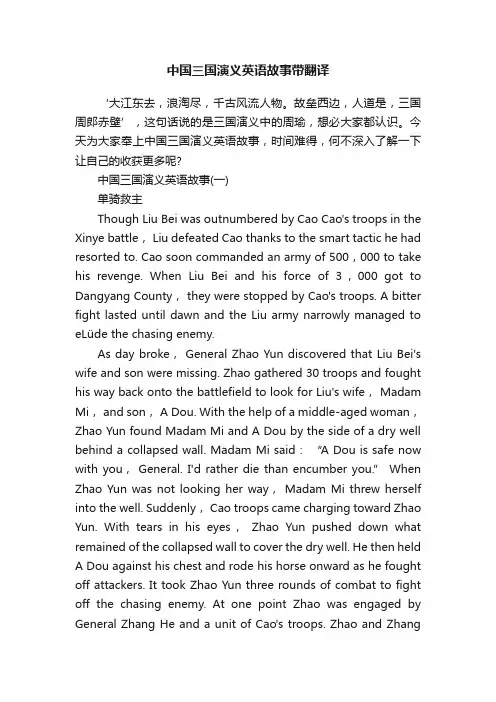
中国三国演义英语故事带翻译‘大江东去,浪淘尽,千古风流人物。
故垒西边,人道是,三国周郎赤壁’,这句话说的是三国演义中的周瑜,想必大家都认识。
今天为大家奉上中国三国演义英语故事,时间难得,何不深入了解一下让自己的收获更多呢?中国三国演义英语故事(一)单骑救主Though Liu Bei was outnumbered by Cao Cao's troops in the Xinye battle, Liu defeated Cao thanks to the smart tactic he had resorted to. Cao soon commanded an army of 500,000 to take his revenge. When Liu Bei and his force of 3,000 got to Dangyang County, they were stopped by Cao's troops. A bitter fight lasted until dawn and the Liu army narrowly managed to eLüde the chasing enemy.As day broke, General Zhao Yun discovered that Liu Bei's wife and son were missing. Zhao gathered 30 troops and fought his way back onto the battlefield to look for Liu's wife, Madam Mi, and son, A Dou. With the help of a middle-aged woman,Zhao Yun found Madam Mi and A Dou by the side of a dry well behind a collapsed wall. Madam Mi said:“A Dou is safe now with you,General. I'd rather die than encumber you.” When Zhao Yun was not looking her way,Madam Mi threw herself into the well. Suddenly, Cao troops came charging toward Zhao Yun. With tears in his eyes,Zhao Yun pushed down what remained of the collapsed wall to cover the dry well. He then held A Dou against his chest and rode his horse onward as he fought off attackers. It took Zhao Yun three rounds of combat to fight off the chasing enemy. At one point Zhao was engaged by General Zhang He and a unit of Cao's troops. Zhao and Zhangfought a dozen rounds and Zhao tried to break the siege. But Zhao Yun and his horse unexpectedly fell into a trap. Just as Zhang He charged to pierce Zhao Yun with his spear,Zhao's horse leapt out of the trap. Zhang He was taken aback by the sudden move and his horse backed off several gaits. Zhao Yun fought Cao's generals and troops single-handedly. No one could get close to him. Cao Cao, who was watching the battle from a nearby hilltop, ordered that Zhao Yun be captured alive. Zhao Yun made the most of Cao's no-kill order and broke through the siege in the end. When he returned to his camp,Zhao Yun handed the young master to Liu Bei.新野一战,刘备以少胜多打败曹操,曹操引五十万大宫前来报仇。
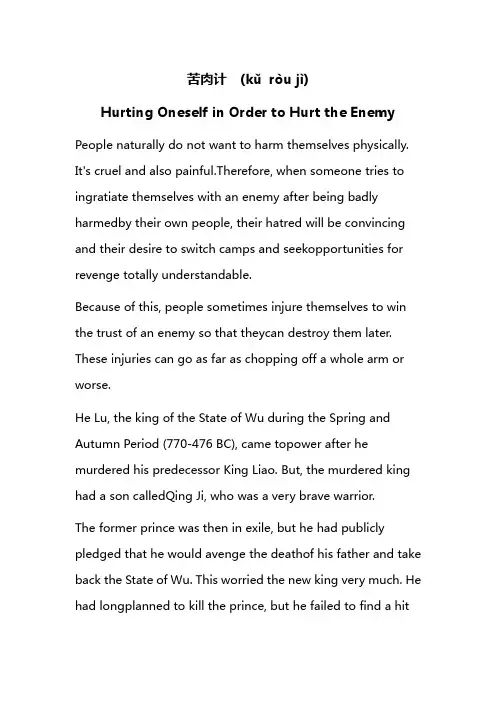
苦肉计(kǔròu jì)Hurting Oneself in Order to Hurt the Enemy People naturally do not want to harm themselves physically. It's cruel and also painful.Therefore, when someone tries to ingratiate themselves with an enemy after being badly harmedby their own people, their hatred will be convincing and their desire to switch camps and seekopportunities for revenge totally understandable.Because of this, people sometimes injure themselves to win the trust of an enemy so that theycan destroy them later. These injuries can go as far as chopping off a whole arm or worse.He Lu, the king of the State of Wu during the Spring and Autumn Period (770-476 BC), came topower after he murdered his predecessor King Liao. But, the murdered king had a son calledQing Ji, who was a very brave warrior.The former prince was then in exile, but he had publicly pledged that he would avenge the deathof his father and take back the State of Wu. This worried the new king very much. He had longplanned to kill the prince, but he failed to find a hitman who could do the job.One day, an official recommended a man called Yao Li to the king, saying he was the rightcandidate to carry out the assassination.At first, the king did not believe this short, ugly man could be a match for the young warrior. Butafter talking to him, he was convinced and the two cooked up a cruel scheme.The following day Yao seriously insulted the king in front of many people. The king was so angry,he ordered his men to chop off Yao's right arm and throw him into prison.A few days later, the mutilated man "accidentally" escaped from the prison and fled to aneighboring state to look for refuge with the former prince.Although the prince was recruiting men to build up his own army, he was suspicious of Yao'sstory. So, he sent out someone to the State of Wu to check it out.When the scout came back, he not only confirmed Yao's story, but also brought back the newsthat Yao's wife had been beheaded by the king after his escape.The prince was finally convinced and trusted Yao with the task of training his soldiers andbuilding warships.When he thought he was ready and after being constantlyencouraged by Yao, the princelaunched an attack against the king of Wu.But midway through the journey, when the prince and Yao were on the same ship, Yao took anopportunity to stab the prince to death and then immediately slit his own throat. After using the self-injury tactic to successfully remove the former prince, the king of Wu securedhis power and dominated the southern region for many years.Today, this self-injury trick is still being widely applied, and sometimes, it even works in job-hopping or love affairs.。
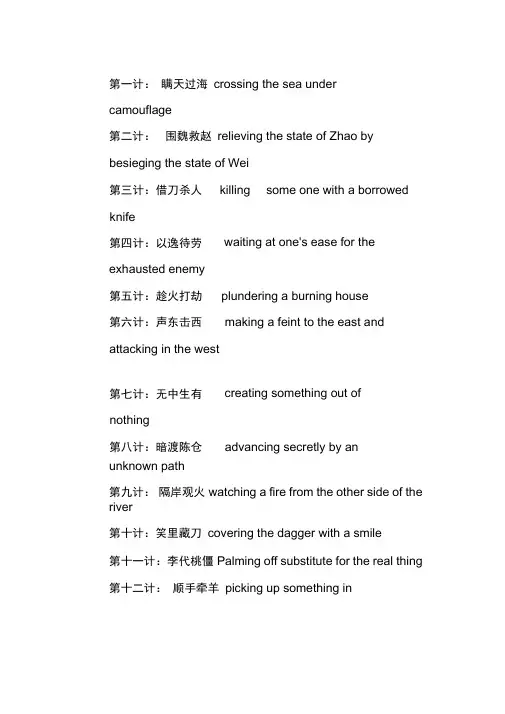
unknown path第九计: 隔岸观火 watching a fire from the other side of the river第十计:笑里藏刀 covering the dagger with a smile第十一计:李代桃僵 Palming off substitute for the real thing 第十二计: 顺手牵羊 picking up something in第一计: 瞒天过海 crossing the sea under camouflage 第二计: 围魏救赵 relieving the state of Zhao by besieging the state of Wei 第三计:借刀杀人 knife 第四计:以逸待劳 exhausted enemy 第五计:趁火打劫 第六计:声东击西 killing some one with a borrowed waiting at one's ease for the plundering a burning house making a feint to the east and attacking in the west 第七计:无中生有 creating something out of nothing第八计:暗渡陈仓 advancing secretly by an第 套攻战计 第十七计: passing第十三计:打草惊蛇 beating the grass to frighten the snake 第十四计: 借尸还魂 resurrecting a dead soul byborrowing acorpse第十五计: 调虎离山 luring the tiger out of his den 第十六计: 欲擒故纵 letting the enemy off inorder to catch him抛砖引玉 giving the enemy something to induce him to lose more valuable things 第十八计: 擒贼擒王capturing the ringleader first in order to capture all the followers第四 第十九计: 釜底抽薪extracting the firewood from 套 under the cauldron混 第二十计: 混水摸鱼 muddling the water to catch 战 the fish; fishing in troubled waters计 第二十一计: 金蝉脱壳 slipping away by casting第五套并战计off a cloak; getting away like the cicada sloughing its skin 第二十二计:关门捉贼catching the thief by closingblocking his escape route第二十三计:远交近攻befriending thedistant enemy while attacking a nearby enemy 第二十四计:假途伐虢attacking the enemy by passing through a common neighbor第二十五计:偷梁换柱stealing the beams and pillars and replacing them with rotten timbers第二十六计:指桑骂槐reviling abusing the locust tree while pointing to the mulberry第二十七计:假痴不颠feigning madness withoutbecoming insane第二十八计:上屋抽梯removing the ladder afterthe enemy has climbed up the roof第二十九计:树上开花putting artificial flowerson trees第三十计:反客为主turning from the guest into he host第六套败战计conceal unpreparedness第三十三计:第三十六计:第三十一计:美人计using seductive women to co rrupt the enemy第三十二计:空城计presenting a bold frontto反间计sowing discord among the enemy第三十四计:苦肉计deceiving he enemy by tortu ring one's own man第三十五计:连环计coordinating one stratagemwith another走为上decamping being the best; r unning away as the best choice。
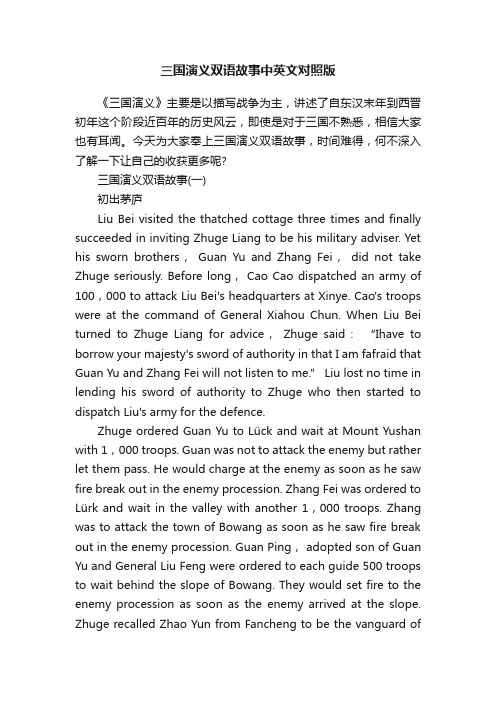
三国演义双语故事中英文对照版《三国演义》主要是以描写战争为主,讲述了自东汉末年到西晋初年这个阶段近百年的历史风云,即使是对于三国不熟悉,相信大家也有耳闻。
今天为大家奉上三国演义双语故事,时间难得,何不深入了解一下让自己的收获更多呢?三国演义双语故事(一)初出茅庐Liu Bei visited the thatched cottage three times and finally succeeded in inviting Zhuge Liang to be his military adviser. Yet his sworn brothers,Guan Yu and Zhang Fei,did not take Zhuge seriously. Before long, Cao Cao dispatched an army of 100,000 to attack Liu Bei's headquarters at Xinye. Cao's troops were at the command of General Xiahou Chun. When Liu Bei turned to Zhuge Liang for advice,Zhuge said:“Ihave to borrow your majesty's sword of authority in that I am fafraid that Guan Yu and Zhang Fei will not listen to me.” Liu lost no time in lending his sword of authority to Zhuge who then started to dispatch Liu's army for the defence.Zhuge ordered Guan Yu to Lück and wait at Mount Yushan with 1,000 troops. Guan was not to attack the enemy but rather let them pass. He would charge at the enemy as soon as he saw fire break out in the enemy procession. Zhang Fei was ordered to Lürk and wait in the valley with another 1,000 troops. Zhang was to attack the town of Bowang as soon as he saw fire break out in the enemy procession. Guan Ping, adopted son of Guan Yu and General Liu Feng were ordered to each guide 500 troops to wait behind the slope of Bowang. They would set fire to the enemy procession as soon as the enemy arrived at the slope. Zhuge recalled Zhao Yun from Fancheng to be the vanguard ofLiu's army. But Zhao was ordered not to defeat the advancing enemy but rather pretend to be defeated. Liu Bei was given 1,000 troops as the back up force.Guan Yu was so curious that he asked:“We all go out to fight the battle. But what will you do?” Zhuge Lian g answered smiling,“I will sit and wait here in town.” Zhang Fei burst into larghter and said:“We all go out to risk our lives while you enjoy your time carefree inside the town!” Zhuge said:“I have the sword of authority. Those who disobey my orders will be executed.” Guan and Zhang had nothing more to say, but they walked away sneeringly.Since the generals carried out Zhuge Liang's orders to the letter, the enemy was routed Zhuge's first military advice truned out to be smart and farsighted. Guan Yu, Zhang Fei and other generals in the Liu camp soon came to respect the new military adviser.刘备三顾茅庐请出诸葛亮并拜为军师。

《孙子兵法》三十六计英语翻译1.【瞒天过海】crossing the sea under camouflage2.【围魏救赵】relieving the state of Zhao by besieging the state of Wei3.【借刀杀人】killing someone with a borrowed knife4.【以逸待劳】waiting at one’s ease for the exhausted enemy5.【趁火打劫】plundering a burning house6.【声东击西】making a feint to the east and attacking in the west7.【无中生有】creating something out of nothing8.【暗渡陈仓】advancing secretly by an unknown path9.【隔岸观火】watching a fire from the other side of the river10.【笑里藏刀】covering the dagger with a smile11.【李代桃僵】palming off substitute for the real thing12.【顺手牵羊】picking up something in passing13.【打草惊蛇】beating the grass to frighten the snake14.【借尸还魂】resurrecting a dead soul by borrowing a corpse15.【调虎离山】luring the tiger out of his den16.【欲擒故纵】letting the enemy off in order to catch him17.【抛砖引玉】giving the enemy something to induce him to lose more valuable things18.【擒贼擒王】capturing the ringleader first in order tocapture all the followers19.【釜底抽薪】extracting the firewood from under the cauldron20.【混水摸鱼】muddling the water to catch the fish; fishing in troubled waters21.【金蝉脱壳】slipping away by casting off a cloak; getting away like the cicada sloughing its skin22.【关门捉贼】catching the thief by closing / blocking his escape route23.【远交近攻】befriending the distant enemy while attackinga nearby enemy24.【假途伐虢】attacking the enemy by passing through a common neighbor25.【偷梁换柱】stealing the beams and pillars and replacing them with rotten timbers26.【指桑骂槐】reviling/ abusing the locust tree while pointing to the mulberry27.【假痴不癫】feigning madness without becoming insane28.【上屋抽梯】removing the ladder after the enemy has climbed up the roof29.【树上开花】putting artificial flowers on trees30.【反客为主】turning from the guest into the host31.【美人计】using seductive women to corrupt the enemy32.【空城计】presenting a bold front to conceal unpreparedness33.【反间计】sowing discord among the enemy34.【苦肉计】deceiving the enemy by torturing one’s own man35.【连环计】coordinating one stratagem with another36.【走为上计】decamping being the best。
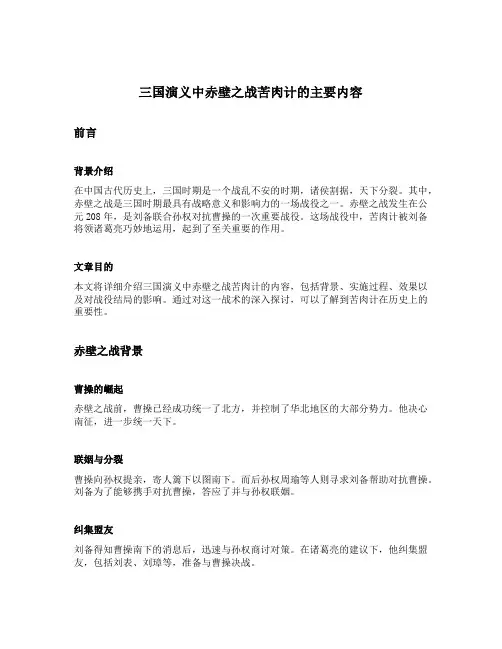
三国演义中赤壁之战苦肉计的主要内容前言背景介绍在中国古代历史上,三国时期是一个战乱不安的时期,诸侯割据,天下分裂。
其中,赤壁之战是三国时期最具有战略意义和影响力的一场战役之一。
赤壁之战发生在公元208年,是刘备联合孙权对抗曹操的一次重要战役。
这场战役中,苦肉计被刘备将领诸葛亮巧妙地运用,起到了至关重要的作用。
文章目的本文将详细介绍三国演义中赤壁之战苦肉计的内容,包括背景、实施过程、效果以及对战役结局的影响。
通过对这一战术的深入探讨,可以了解到苦肉计在历史上的重要性。
赤壁之战背景曹操的崛起赤壁之战前,曹操已经成功统一了北方,并控制了华北地区的大部分势力。
他决心南征,进一步统一天下。
联姻与分裂曹操向孙权提亲,寄人篱下以图南下。
而后孙权周瑜等人则寻求刘备帮助对抗曹操。
刘备为了能够携手对抗曹操,答应了并与孙权联姻。
纠集盟友刘备得知曹操南下的消息后,迅速与孙权商讨对策。
在诸葛亮的建议下,他纠集盟友,包括刘表、刘璋等,准备与曹操决战。
苦肉计的实施过程伪降的筹备为了引诱曹操上当,刘备派遣了自己的大将黄盖向曹操投降,并将自己的计划告知曹操。
黄盖通过各种手段,使得曹操完全相信他的诚意。
若即若离的行动在黄盖投降之后,刘备军开始采取了一系列的行动。
他们故意向曹军逼近,然后再次故意撤退,继续若即若离地进行着一连串的行动。
赤壁之战的发生在刘备军以若即若离的态度引诱曹军的过程中,曹操最终决定率领大军追击刘备。
于是,在赤壁之战的所在地,曹操与刘备军展开激烈的对战。
火烧赤壁与苦肉计的结合正当曹操大军与刘备军陷入僵持时,刘备军实施了火烧赤壁的计划。
利用东风将曹操船只引燃,使曹军陷入一片混乱。
而刘备军也在此时使用了苦肉计,装病发送信使向曹操陈述自己兵败粮尽、疾病缠身的情况。
苦肉计的效果与影响曹操的疑虑接到刘备军发送的陈述状况的信使后,曹操开始怀疑刘备军有诈。
但由于曹操实力过于庞大,曹操依然希望能够尽快结束战争,于是他决定前去会合。
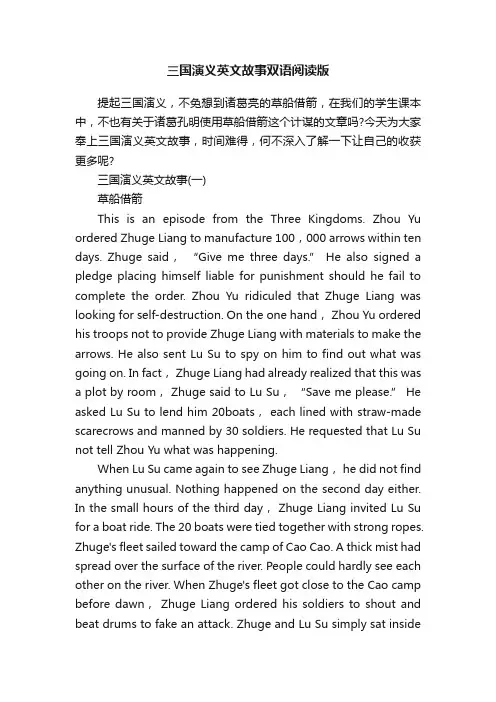
三国演义英文故事双语阅读版提起三国演义,不免想到诸葛亮的草船借箭,在我们的学生课本中,不也有关于诸葛孔明使用草船借箭这个计谋的文章吗?今天为大家奉上三国演义英文故事,时间难得,何不深入了解一下让自己的收获更多呢?三国演义英文故事(一)草船借箭This is an episode from the Three Kingdoms. Zhou Yu ordered Zhuge Liang to manufacture 100,000 arrows within ten days. Zhuge said,“Give me three days.” He also signed a pledge placing himself liable for punishment should he fail to complete the order. Zhou Yu ridiculed that Zhuge Liang was looking for self-destruction. On the one hand, Zhou Yu ordered his troops not to provide Zhuge Liang with materials to make the arrows. He also sent Lu Su to spy on him to find out what was going on. In fact, Zhuge Liang had already realized that this was a plot by room, Zhuge said to Lu Su,“Save me please.” He asked Lu Su to lend him 20boats, each lined with straw-made scarecrows and manned by 30 soldiers. He requested that Lu Su not tell Zhou Yu what was happening.When Lu Su came again to see Zhuge Liang, he did not find anything unusual. Nothing happened on the second day either. In the small hours of the third day, Zhuge Liang invited Lu Su for a boat ride. The 20 boats were tied together with strong ropes. Zhuge's fleet sailed toward the camp of Cao Cao. A thick mist had spread over the surface of the river. People could hardly see each other on the river. When Zhuge's fleet got close to the Cao camp before dawn,Zhuge Liang ordered his soldiers to shout and beat drums to fake an attack. Zhuge and Lu Su simply sat insideone of the boats and drank wines to enjoy themselves.As soon as the Cao camp heard the shouting and drum beating, they mistook it for a surprise attack by the Zhou Yu camp. Since they could see nobody on the river, they gathered 3,000 bow men and ordered them to shoot arrows towards where the shouting and drum beating came. The front of the scarecrows was quickly shot full of arrows. After a while, Zhuge Liang had his fleet turned around to expose the other side of the scarecrows. When this side was also shot full of arrows, the day broke. Zhuge Liang ordered his soldiers to return to their base port. The soldiers shouted,“Thank you, Cao Cao, for your arrows.” After they got back to their camp, they collected more than 100,000 arrows from the scarecrows.东吴与刘备联合抗曹,东吴大都督周瑜命诸葛亮十日内制作十万支箭。
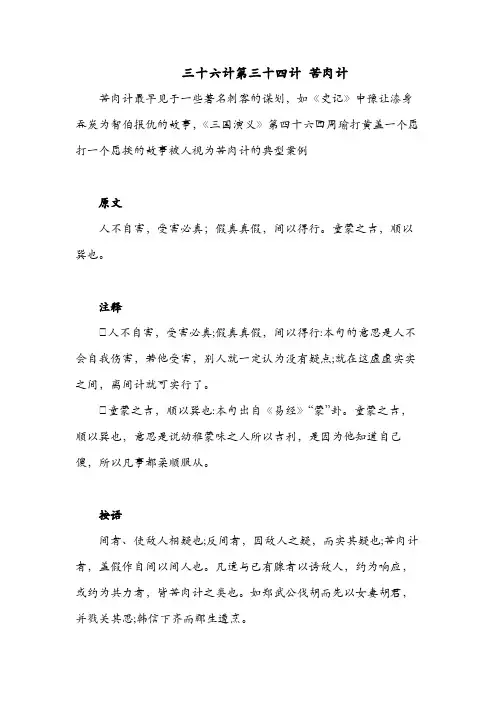
三十六计第三十四计苦肉计苦肉计最早见于一些著名刺客的谋划,如《史记》中豫让漆身吞炭为智伯报仇的故事,《三国演义》第四十六回周瑜打黄盖一个愿打一个愿挨的故事被人视为苦肉计的典型案例原文人不自害,受害必真;假真真假,间以得行。
童蒙之吉,顺以巽也。
注释①人不自害,受害必真;假真真假,间以得行:本句的意思是人不会自我伤害,若他受害,别人就一定认为没有疑点;就在这虚虚实实之间,离间计就可实行了。
①童蒙之吉,顺以巽也:本句出自《易经》“蒙”卦。
童蒙之吉,顺以巽也,意思是说幼稚蒙味之人所以吉利,是因为他知道自己傻,所以凡事都柔顺服从。
按语间者、使敌人相疑也;反间者,因敌人之疑,而实其疑也;苦肉计者,盖假作自间以间人也。
凡遣与已有腺者以诱敌人,约为响应,或约为共力者,皆苦肉计之类也。
如郑武公伐胡而先以女妻胡君,并戮关其思;韩信下齐而郦生遭烹。
译文人不会自我伤害,若他受害,别人就一定认为没有疑点;就在这虚虚实实之间,离间计就可实行了。
就像幼稚蒙昧之人所以古利,是因为他知道自己傻,所以凡事都柔顺服从外界的变化用间谍,就是使敌人互相猜忌;反间就是利用敌人内部的矛盾。
地加他们的猜忌;苦肉计,就是假装去做敌人的间谍,而实际上是到敌方从事间谍活动。
凡是那些派遣同己方有仇恨的人去引诱敌人,和敌人约定做内应或是协同作战,都属于苦肉计的范畴。
郑国武公伐胡,竟先将自己的女儿许配给胡国的君主,并杀掉了主张伐胡的关其思,使胡不防郑国。
汉高祖派郦食其劝齐王降汉,韩信在双方谈判时突然伐齐,齐王怒而煮死了邮食其。
原典解读打仗不容易,打胜仗更难。
在僵持不下的时候,做出一些自我牺牲,小去大来之间,会有意想不到的收获。
苦肉计的第一个条件就是给敌人一个相信你内部分裂的理由。
无缘无故搞分裂投靠别人,傻子也不会相信,所以找个别人无法拒绝的借口很重要。
此外,施计要在大庭广众下,这样会借风快速传到你想要传到的每个角落。
流言的特点是越传越真,这样有助于你的敌人对此深信不疑。
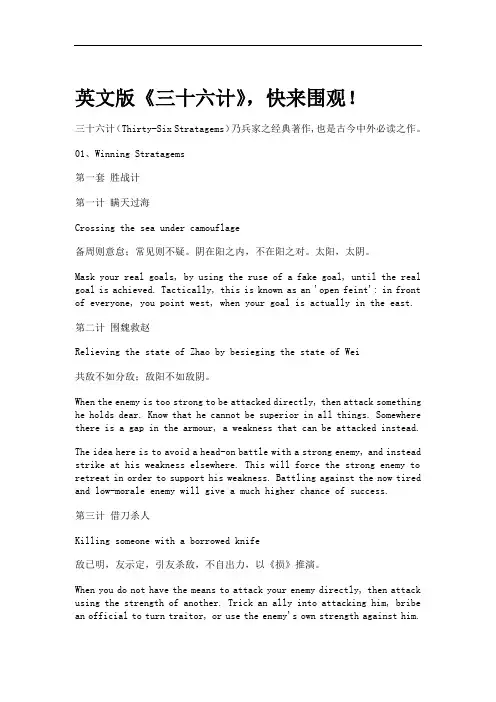
英文版《三十六计》,快来围观!三十六计(Thirty-Six Stratagems)乃兵家之经典著作,也是古今中外必读之作。
01、Winning Stratagems第一套胜战计第一计瞒天过海Crossing the sea under camouflage备周则意怠;常见则不疑。
阴在阳之内,不在阳之对。
太阳,太阴。
Mask your real goals, by using the ruse of a fake goal, until the real goal is achieved. Tactically, this is known as an 'open feint': in front of everyone, you point west, when your goal is actually in the east.第二计围魏救赵Relieving the state of Zhao by besieging the state of Wei共敌不如分敌;敌阳不如敌阴。
When the enemy is too strong to be attacked directly, then attack something he holds dear. Know that he cannot be superior in all things. Somewhere there is a gap in the armour, a weakness that can be attacked instead.The idea here is to avoid a head-on battle with a strong enemy, and instead strike at his weakness elsewhere. This will force the strong enemy to retreat in order to support his weakness. Battling against the now tired and low-morale enemy will give a much higher chance of success.第三计借刀杀人Killing someone with a borrowed knife敌已明,友示定,引友杀敌,不自出力,以《损》推演。
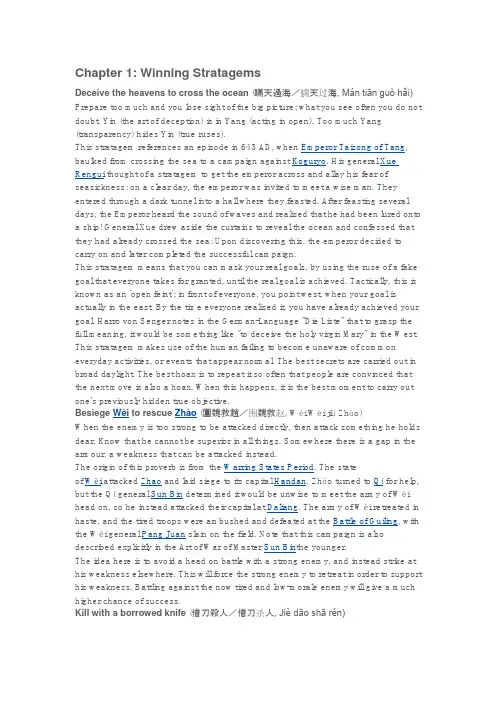
Chapter 1: Winning StratagemsDeceive the heavens to cross the ocean (瞞天過海/瞒天过海, Mán tiān guò hǎi) Prepare too much and you lose sight of the big picture; what you see often you do not doubt. Yin (the art of deception) is in Yang (acting in open). Too much Yang (transparency) hides Yin (true ruses).This stratagem references an episode in 643 AD, when Emperor Taizong of Tang, baulked from crossing the sea to a campaign against Koguryo. His general Xue Rengui thought of a stratagem to get the emperor across and allay his fear of seasickness: on a clear day, the emperor was invited to meet a wise man. They entered through a dark tunnel into a hall where they feasted. After feasting several days, the Emperor heard the sound of waves and realised that he had been lured onto a ship! General Xue drew aside the curtains to reveal the ocean and confessed that they had already crossed the sea: Upon discovering this, the emperor decided to carry on and later completed the successful campaign.This stratagem means that you can mask your real goals, by using the ruse of a fake goal that everyone takes for granted, until the real goal is achieved. Tactically, this is known as an 'open feint'; in front of everyone, you point west, when your goal is actually in the east. By the time everyone realised it, you have already achieved your goal. Harro von Senger notes in the German-Language "Die Liste" that to grasp the full meaning, it would be something like "to deceive the holy virgin Mary" in the West. This stratagem makes use of the human failing to become unaware of common everyday activities, or events that appear normal. The best secrets are carried out in broad daylight. The best hoax is to repeat it so often that people are convinced that the next move is also a hoax. When this happens, it is the best moment to carry out one's previously hidden true objective.Besiege Wèi to rescue Zhào (圍魏救趙/围魏救赵, Wéi Wèi jiù Zhào)When the enemy is too strong to be attacked directly, then attack something he holds dear. Know that he cannot be superior in all things. Somewhere there is a gap in the armour, a weakness that can be attacked instead.The origin of this proverb is from the Warring States Period. The stateof Wèi attacked Zhao and laid siege to its capital Handan. Zhào turned to Qí for help, but the Qí general Sun Bin determined it would be unwise to meet the army of Wèi head on, so he instead attacked their capital at Daliang. The army of Wèi retreated in haste, and the tired troops were ambushed and defeated at the Battle of Guiling, with the Wèi general Pang Juan slain on the field. Note that this campaign is also described explicitly in the Art of War of Master Sun Bin the younger.The idea here is to avoid a head on battle with a strong enemy, and instead strike at his weakness elsewhere. This will force the strong enemy to retreat in order to support his weakness. Battling against the now tired and low-morale enemy will give a much higher chance of success.Kill with a borrowed knife (借刀殺人/借刀杀人, Jiè dāo shā rén)Attack using the strength of another (in a situation where using one's own strength is not favourable). Trick an ally into attacking him, bribe an official to turn traitor, or use the enemy's own strength against him.The idea here is to cause damage to the enemy by getting a 3rd party to do the deed. Leisurely await for the laboured (以逸待勞/以逸待劳, Yǐ yì dài láo)It is an advantage to choose the time and place for battle. In this way you know when and where the battle will take place, while your enemy does not. Encourage your enemy to expend his energy in futile quests while you conserve your strength. When he is exhausted and confused, you attack with energy and purpose.The idea is to have your troops well-prepared for battle, in the same time that the enemy is rushing to fight against you. This will give your troops a huge advantage in the upcoming battle, of which you will get to select the time and place.Loot a burning house (趁火打劫, Chèn huǒ dǎ jié)When a country is beset by internal conflicts, when disease and famine ravage the population, when corruption and crime are rampant, then it will be unable to deal with an outside threat. This is the time to attack.Keep gathering internal information about an enemy. If the enemy is currently in its weakest state ever, attack it without mercy and totally destroy it to prevent future troubles.Make a sound in the east, then strike in the west (聲東擊西/声东击西, Shēngdōng jí xī)In any battle the element of surprise can provide an overwhelming advantage. Even when face to face with an enemy, surprise can still be employed by attacking where he least expects it. To do this you must create an expectation in the enemy's mind through the use of a feint.The idea here is to get the enemy to focus his forces in a location, and then attack elsewhere which would be weakly defended.[edit]Chapter 2: Enemy Dealing StratagemsCreate something from nothing (無中生有/无中生有, Wú zhōng shēng yǒu)A plain lie. Make somebody believe there was something when there is in fact nothing.One method of using this stratagem is to create an illusion of something's existence, while it does not exist. Another method is to create an illusion that something does not exist, while it does.Openly repair the gallery roads, but sneak through the passageof Chencang (暗渡陳倉/暗渡陈仓, Àn dù chén cāng)Deceive the enemy with an obvious approach that will take a very long time, while surprising him by taking a shortcut and sneak up to him. As the enemy concentrates on the decoy, he will miss you sneaking up to him.The phrase originated from the Chu-Han contention, where Liu Bang retreated to the lands of Sichuan to prepare for a confrontation with Xiang Yu. Once he was fullyprepared, Liu Bang sent men to openly repair the gallery roads he had destroyed earlier, while secretly moving his troops towards Guanzhong through the small town of Chencang instead. When Xiang Yu received news of Liu Bang repairing the gallery roads, he dismissed the threat since he knew the repairs would take years to complete. This allowed Liu Bang to retake Guanzhong by surprise, and eventually led to his victory over Xiang Yu and the birth of the Han Dynasty.This tactic is an extension of the "Make a sound in the east, then strike in the west" tactic. But instead of simply spreading misinformation to draw the enemy's attention, physical baits are used to increase the enemy's certainty on the misinformation. These baits must be easily seen by the enemy, to ensure that they draw the enemy's attention. At the same time, the baits must act as if what they meant to do what they were falsely doing, to avoid drawing the enemy's suspicion.Watch the fires burning across the river (隔岸觀火/隔岸观火, Gé àn guān huǒ) Delay entering the field of battle until all the other players have become exhausted fighting amongst themselves. Then go in at full strength and pick up the pieces.Hide a knife behind a smile (笑裏藏刀/笑里藏刀, Xiào lǐ cáng dāo)Charm and ingratiate yourself to your enemy. When you have gained his trust, move against him in secret.Sacrifice the plum tree to preserve the peach tree (李代桃僵, Lǐ dài táo jiāng) There are circumstances in which you must sacrifice short-term objectives in order to gain the long-term goal. This is the scapegoat stratagem whereby someone else suffers the consequences so that the rest do not.Take the opportunity to pilfer a goat (順手牽羊/顺手牵羊, Shùn shǒu qiān yáng) While carrying out your plans be flexible enough to take advantage of any opportunity that presents itself, however small, and avail yourself of any profit, however slight. [edit]Chapter 3: Attacking StratagemsStomp the grass to scare the snake (打草驚蛇/打草惊蛇, Dá cǎo jīng shé)Do something unaimed, but spectacular ("hitting the grass") to provoke a response of the enemy ("startle the snake"), thereby giving away his plans or position, or just taunt him. Do something unusual, strange, and unexpected as this will arouse the enemy's suspicion and disrupt his thinking. More widely used as "[Do not] startle the snake by hitting the grass". An imprudent act will give your position or intentions away to the enemy.Borrow a corpse to resurrect the soul (借屍還魂/借尸还魂, Jiè shī huán hún) Take an institution, a technology, a method, or even an ideology that has been forgotten or discarded and appropriate it for your own purpose. Revive something from the past by giving it a new purpose or bring to life old ideas, customs, or traditions and reinterpret them to fit your purposes.Entice the tiger to leave its mountain lair (調虎離山/调虎离山, Diào hǔ lí shān)Never directly attack an opponent whose advantage is derived from its position. Instead lure him away from his position thus separating him from his source of strength.In order to capture, one must let loose (欲擒故縱/欲擒故纵, Yù qín gū zòng) Cornered prey will often mount a final desperate attack. To prevent this you let the enemy believe he still has a chance for freedom. His will to fight is thus dampened by his desire to escape. When in the end the freedom is proven a falsehood the enemy's morale will be defeated and he will surrender without a fight.Tossing out a brick to get a jade gem (拋磚引玉/抛砖引玉, Pāo zhuān yǐn yù)Bait someone by making him believe he gains something or just make him react to it ("toss out a brick") and obtain something valuable from him in return ("get a jade gem").This proverb is based on a story involving two famous poets of the Tang Dynasty. There was a great poet named Zhao Gu (趙嘏) and another lesser poet by the name of Chang Jian (常建). While Chang Jian was travelling in Suzhou, he heard news that Zhao Gu would be visiting a temple in the area. Chang Jian wished to learn from the master poet, so he devised a plan and went to the temple in advance, then wrote a poem on the temple walls with only two of the four lines completed, hoping Zhao Gu would see it and finish the poem. Zhao Gu acted as Chang Jian foresaw, and from this story came the proverb.Defeat the enemy by capturing their chief (擒賊擒王/擒贼擒王, Qín zéi qín wáng) If the enemy's army is strong but is allied to the commander only by money, superstition or threats, then take aim at the leader. If the commander falls the rest of the army will disperse or come over to your side. If, however, they are allied to the leader through loyalty then beware, the army can continue to fight on after his death out of vengeance.[edit]Chapter 4: Chaos StratagemsRemove the firewood from under the pot (釜底抽薪, Fǔ dǐ chōu xīn)If something must be destroyed, destroy the source.Catch a fish while the water is disturbed (混水摸魚/混水摸鱼, Hún shuǐ mō yú) Create confusion and use this confusion to further your own goals.Slough off the cicada's golden shell (金蟬脱殼/金蝉脱壳, Jīn chán tuō qiào)It's a stratagem mainly used to escape from enemy of a more superior force. One use this stratagem by slough off one's shell, which tricked the enemy to believe to have grasped one's essential. Mask yourself. Either leave flamboyant traits behind, thus going incognito; or just masquerade yourself and create an illusion to fit your goals and distract others.Shut the door to catch the thief (關門捉賊/关门捉贼, Guān mén zhōu zéi)To capture your enemy, or more generally in fighting wars, to deliver the final blow to your enemy, you must plan prudently if you want to succeed. Do not rush into action.Before you "move in for the kill", first cut off your enemy's escape routes, and cut off any routes through which outside help can reach them.Befriend a distant state while attacking a neighbour (遠交近攻/远交近攻, Yuǎn jiāo jìn gōng)It is known that nations that border each other become enemies while nations separated by distance and obstacles make better allies. When you are the strongest in one field, your greatest threat is from the second strongest in your field, not the strongest from another field. This policy is associated with Fan Sui of Qin, circa 269 BC.Obtain safe passage to conquer the State of Guo (假道伐虢, Jiǎ dào fá Guó) Borrow the resources of an ally to attack a common enemy. Once the enemy is defeated, use those resources to turn on the ally that lent you them in the first place. See Duke Xian of Jin.[edit]Chapter 5: Proximate StratagemsReplace the beams with rotten timbers (偷梁換柱/偷梁换柱, Tōu liáng huàn zhù) Disrupt the enemy's formations, interfere with their methods of operations, change the rules in which they are used to follow, go contrary to their standard training. In this way you remove the supporting pillar, the common link that makes a group of men an effective fighting force.Point at the mulberry tree while cursing the locust tree (指桑罵槐/指桑骂槐, Zhǐ sāng mà huái)To discipline, control, or warn others whose status or position excludes them from direct confrontation; use analogy and innuendo. Without directly naming names, those accused cannot retaliate without revealing their complicity.Feign madness but keep your balance (假痴不癲/假痴不癫, Jiǎchī bù diān)Hide behind the mask of a fool, a drunk, or a madman to create confusion about your intentions and motivations. Lure your opponent into underestimating your ability until, overconfident, he drops his guard. Then you may attack.Remove the ladder when the enemy has ascended to the roof (上屋抽梯, Shàng wū chōu tī)With baits and deceptions, lure your enemy into treacherous terrain. Then cut off his lines of communication and avenue of escape. To save himself, he must fight both your own forces and the elements of nature.Deck the tree with false blossoms (樹上開花/树上开花, Shù shàng kāi huā)Tying silk blossoms on a dead tree gives the illusion that the tree is healthy. Through the use of artifice and disguise, make something of no value appear valuable; of no threat appear dangerous; of no use appear useful. This is the same stratagemas Potemkin villages.Make the host and the guest exchange roles (反客為主/反客为主, Fǎn kè wéizhǔ)Usurp leadership in a situation where you are normally subordinate. Infiltrate your target. Initially, pretend to be a guest to be accepted, but develop from inside and become the owner later.[edit]Chapter 6: Defeat StratagemsThe beauty trap (honey trap) (美人計/美人计, Měi rén jì)Send your enemy beautiful women to cause discord within his camp. This stratagem can work on three levels. First, the ruler becomes so enamoured with the beauty that he neglects his duties and allows his vigilance to wane. Second, other males at court will begin to display aggressive behaviour that inflames minor differences hindering co-operation and destroying morale. Third, other females at court, motivated by jealousy and envy, begin to plot intrigues further exacerbating the situation.The empty fort strategy (空城計/空城计, Kōng chéng jì)When the enemy is superior in numbers and your situation is such that you expect to be overrun at any moment, then drop all presence of military preparedness, act calmly and appear disrespect of the enemy, so that the enemy will think you have hidden huge power and you want to trap them into the fort with your calm and easiness. This has to be used when in most of the cases, you do have huge power hidden under the disguise and you only play the real empty rarely. This depends on having a clever opponent who, in perceiving a trap, may over-think their reaction[4].Let the enemy's own spy sow discord in the enemy camp (反間計/反间计, Fǎn jiàn jì)Undermine your enemy's ability to fight by secretly causing discord between him and his friends, allies, advisors, family, commanders, soldiers, and population. While he is preoccupied settling internal disputes, his ability to attack or defend, is compromised. Inflict injury on oneself to win the enemy's trust (苦肉計/苦肉计, Kǔ ròu jì) Pretending to be injured has two possible applications. In the first, the enemy is lulled into relaxing his guard since he no longer considers you to be an immediate threat. The second is a way of ingratiating yourself to your enemy by pretending the injury was caused by a mutual enemy.Chain stratagems (連環計/连环计, Lián huán jì)In important matters, one should use several stratagems applied simultaneously after another as in a chain of stratagems. Keep different plans operating in an overall scheme; however, in this manner if any one stratagem fails, then the chain breaks and the whole scheme fails.If everything else fails, retreat (走為上/走为上, Zǒu wéi shàng)If it becomes obvious that your current course of action will lead to defeat, then retreat and regroup. When your side is losing, there are only three choices remaining: surrender, compromise, or escape. Surrender is complete defeat, compromise is half defeat, but escape is not defeat. As long as you are not defeated, you still have a chance.[edit。
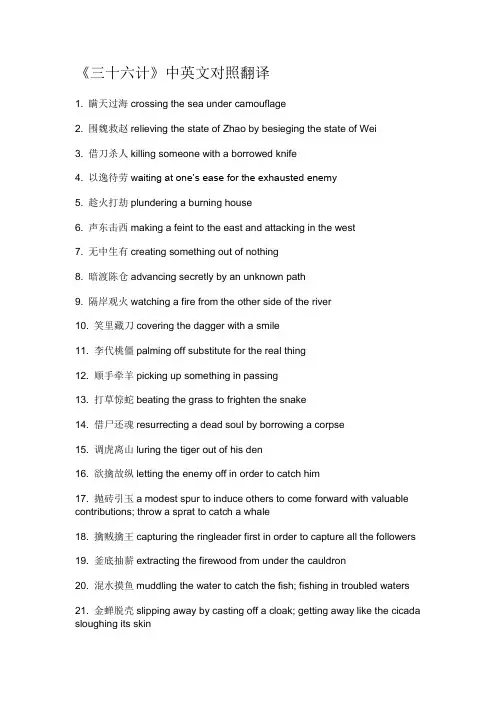
《三十六计》中英文对照翻译1. 瞒天过海crossing the sea under camouflage2. 围魏救赵relieving the state of Zhao by besieging the state of Wei3. 借刀杀人killing someone with a borrowed knife4. 以逸待劳waiting at one’s ease for the exhausted enemy5. 趁火打劫plundering a burning house6. 声东击西making a feint to the east and attacking in the west7. 无中生有creating something out of nothing8. 暗渡陈仓advancing secretly by an unknown path9. 隔岸观火watching a fire from the other side of the river10. 笑里藏刀covering the dagger with a smile11. 李代桃僵palming off substitute for the real thing12. 顺手牵羊picking up something in passing13. 打草惊蛇beating the grass to frighten the snake14. 借尸还魂resurrecting a dead soul by borrowing a corpse15. 调虎离山luring the tiger out of his den16. 欲擒故纵letting the enemy off in order to catch him17. 抛砖引玉a modest spur to induce others to come forward with valuable contributions; throw a sprat to catch a whale18. 擒贼擒王capturing the ringleader first in order to capture all the followers19. 釜底抽薪extracting the firewood from under the cauldron20. 混水摸鱼muddling the water to catch the fish; fishing in troubled waters21. 金蝉脱壳slipping away by casting off a cloak; getting away like the cicada sloughing its skin22. 关门捉贼catching the thief by closing / blocking his escape route23. 远交近攻befriending the distant enemy while attacking a nearby enemy24. 假途伐虢attacking the enemy by passing through a common neighbor25. 偷梁换柱stealing the beams and pillars and replacing them with rotten timbers26. 指桑骂槐reviling/ abusing the locust tree while pointing to the mulberry27. 假痴不癫feigning madness without becoming insane28. 上屋抽梯removing the ladder after the enemy has climbed up the roof29. 树上开花putting artificial flowers on trees30. 反客为主turning from the guest into the host31. 美人计using seductive women to corrupt the enemy32. 空城计presenting a bold front to conceal unpreparedness33. 反间计sowing discord among the enemy34. 苦肉计deceiving the enemy by torturing one’s own man35. 连环计coordinating one stratagem with another36. 走为上decamping being the best; running away as the best choice。
厉害了!《三十六计》的英文居然能这么翻译!瞒天过海、围魏救赵、暗度陈仓、美人计、走为上……富含古代军事思想和人生哲理的36计,相信大家都能随口来N个,但是你知道它们到底是什么意思吗?用英语又如何表达呢?一起来看看吧!★第一计瞒天过海Crossing the sea under camouflage古:备周则意怠;常见则不疑。
阴在阳之内,不在阳之对。
太阳,太阴。
白:是使用伪装的手段,利用机会,趁对方不注意的时候,出其不意的行动,让人措手不及。
★第二计围魏救赵Relieving the state of Zhao by besieging the state of Wei古:共敌不如分敌;敌阳不如敌阴。
白:利用敌人的精锐去攻打别的国家,当二军相持不下时,趁隙攻占敌方的本土,待敌回国的时候,在途中予以迎头痛击,并把他们消灭掉。
★第三计借刀杀人Killing someone with a borrowed knife古:敌已明,友示定,引友杀敌,不自出力,以《损》推演。
白:利用矛盾、反间、离间等谋略,巧妙的借用别国的力量,来击败敌人,并能保存自己的实力。
★第四计以逸待劳Waiting at one's ease for the exhausted enemy古:困敌之势,不以战;损刚益柔。
白:乃占有利的形势,一面防止敌人的功击,一面养精蓄锐,等到敌人士气低落的时候,再采取主动攻击的策略。
★第五计趁火打劫Plundering a burning house古:敌之害大,就势取利,刚决柔也。
白:趁著人家的家里失火时,闯入屋内掠夺财物,也就,是说趁著敌人处於危险混乱的时候加以攻击的策略。
★第六计声东击西Making a feint to the east and attacking in the west古:敌志乱萃,不虞,坤下兑上之象。
利其不自主而取之。
白:利用巧妙的方法诱敌,使敌人产生错觉,再乘机消灭敌人。
三国演义故事中英文对照阅读版《三国演义》是中国古典四大名著其中一部,也是中国第一部长篇章回体历史演义小说,它的全名是《三国志通俗演义》。
今天为大家奉上三国演义英文故事,时间难得,何不深入了解一下让自己的收获更多呢?三国演义英文故事(一)设连环计The manipulation of state affairs by the prime minister Dong Zhuo towards the end of the Eastern Han Dynasty (25-220) aroused strong anger in people,but nobody dared to air it. Upright ministers wanted to but failed to think of a way to get rid of him. Deep at night and alone in his garden, Wang Yun, a minister, sighed at these worries, his teaful eyes cast up at the moon. Suddenly, he heard a sigh from the pavilion nearby. He went over to see Diao Chan,the sixteen-year-old,very beautiful singsong girl in his family. Upon enquiry, the girl went down on her knees and said,“Your excellency has treated me so nice after Icame. How could I repay your kindness? Ihave noticed your knitted eyebrows, You must have big worries that Idare not ask. Isighed, because Iwish Icould help you in some way.”Who could believe, thought Wang that the destiny of the Han Dynasty lies in this girl's hand. He helped the girl up, then he himself prostrated and kowtowed to her. “Why do you bow to me?” the puzzled girl asked. She repeated her offer to help in any way.Convinced of her res olüte attitude,Wang Yun was straightforward:“Both Dong Zhuo and his stepson Lü Bu love women. I'll take you as my step daughter, then I'll betroth youto Lü Bu before I present you as a gift to Dong Zhuo. You will seek opportunities to sow discord betwee n them and make Lü kill Dong. In this way we can preserve the Han Dynasty.” “If I fail to do as you say,” she vowed,“I will die a violent death.” These were the interlocking stratagems laid by Wang Yun and Diao Chan.东汉末年,太师董卓专权,朝野上下敢怒不敢言。
<<三十六计>>的英文表达<<孙子兵法>>三十六计(Thirty-Six Stratagems)乃兵家之经典著作。
语源于南北朝,成书于明清,是汉民族悠久文化遗产之一。
古人学好三十六计,带兵打胜券在握。
现代人习之,在商场职场生活领域中,古为今用。
而三十六计在外国也极受欢迎……那么就一起看看三十六计的英文表达吧!【1】第一套胜战计Chapter 1: Winning Stratagems第一计瞒天过海crossing the sea under camouflage■原文备周则意怠;常见则不疑。
阴在阳之内,不在阳之对。
太阳,太阴。
翻译:认为准备万分周到,就容易松劲;平时看惯了的,就往往不再怀疑了,秘计隐藏在暴露的事物中,而不是和公开的形式相排斥。
非常公开的往往蕴藏着非常机密的。
根据阴阳相互转化的规律,阳极而阴生,阴极而阳生。
■英文注释Mask your real goals, by using the ruse of a fake goal, until the real goal is achieved. Tactically, this is known as an ‘open feint’: in front of everyone, you point west, when your goal is actually in the east.第二计围魏救赵relieving the state of Zhao by besieging the state of Wei■原文共敌不如分敌;敌阳不如敌阴。
翻译:打击兵力集中的敌人不如打击兵力分散的敌人;正面攻击敌人不如背后偷袭敌人。
树敌不可过多,对敌要各个击破,对现在还不忙于消灭的,要隐藏我们的意图。
■英文注释When the enemy is too strong to be attacked directly, then attack something he holds dear. Know that he cannot be superior in all things. Somewhere there is a gap in the armour, a weakness that can be attacked instead. The idea here is to avoid a head-on battle with a strong enemy, and instead strike at his weakness elsewhere. This will force the strong enemy to retreat in order to support his weakness. Battling against the now tired and low-morale enemy will give a much higher chance of success.第三计借刀杀人killing someone with a borrowed knife■原文敌已明,友未定,引友杀敌。
《三国演义》之苦肉计接二连三的失利让曹操的心中大为恼火,为了更好地对东吴进行监督于是他便派蔡中,蔡和带领人去诈降,当二人来到江东之后周瑜正在和众人商量攻打曹操的计划,他听到蔡中,蔡和前来投降的消息十分高兴,并将他们编在了甘宁的军中。
傍晚时分周瑜正在帐中思考如何实行火攻的方法,忽然黄盖前来交付差事,双方说起当前的局势,黄盖说督都为什么不用火攻,周瑜说我也想用这个计策但是现在却需要有人去诈降,只有这样才能够让曹操相信,黄盖说我受吴侯的大恩无以为报,因此愿意接受这个计谋去报答,于是在他们的商量之中便确定了苦肉计。
次日周瑜升帐之后周瑜说现在曹操的实力强大,我准备给大家三个月的粮草以此来坚守,把曹操的队伍拖垮话音刚落,只听黄盖说到照督都这个说法就算是有十三个月的粮草我没办法拖垮曹操,不如趁早对其打击,如果实在不成就听从张昭的方法投降就好了。
周瑜听到这话之后顿时大怒,他对黄盖说当初想要发动争斗的是你现在要投降的也是以,你这么反复无常扰乱将士的心,于是他便让人将黄盖拖出去斩了,众将士一听这话顿时大吃一惊,于是立刻跪下请求周瑜法外开恩,在众人的请求之下周瑜终于松了口,只听周瑜说死罪可免,活罪难逃,给我拉下去打一百棍,到了这种情况之下众人无法再劝只能眼睁睁看着黄忠在挨了五十棍之后晕倒。
等到黄盖被众人抬去救治之后,鲁肃对诸葛亮说你为什么不劝大都督啊,我们这些人作为臣子不好劝,但是你是客人你可以劝啊,听到这话后诸葛亮便对鲁肃说明了情况,顿时鲁肃恍然大悟。
黄盖醒来之后让人找来阚泽请他去献诈降书,阚泽听到黄盖说明情况之后立即便答应了下来,趁着夜色阚泽来到了曹操营中,哪知道却被将士当作了奸细抓了起来押到了曹操面前。
曹操问你是做什么的,阚泽说我是来现降书的,曹操拿过书信一看立即让人拖出去将阚泽斩了,阚泽一听这话顿时大笑起来,曹操问你笑什么,阚泽回答说我听人说你求贤若渴可是现在看来不是这样啊,曹操说为什么这么说,阚泽说我来现降书反而被冤枉岂不是可笑。
1. 瞒天过海crossing the sea under camouflage2. 围魏救赵relieving the state of Zhao by besieging the state of Wei3. 借刀杀人killing someone with a borrowed knife4. 以逸待劳waiting at one’s ease for the exhausted enemy5. 趁火打劫plundering a burning house6. 声东击西making a feint to the east and attacking in the west7. 无中生有creating something out of nothing8. 暗渡陈仓advancing secretly by an unknown path9. 隔岸观火watching a fire from the other side of the river10. 笑里藏刀covering the dagger with a smile11. 李代桃僵palming off substitute for the real thing12. 顺手牵羊picking up something in passing13. 打草惊蛇beating the grass to frighten the snake14. 借尸还魂resurrecting a dead soul by borrowing a corpse15. 调虎离山luring the tiger out of his den16. 欲擒故纵letting the enemy off in order to catch him17. 抛砖引玉a modest spur to induce others to come forward with valuable contributions; throw a sprat to catch a whale18. 擒贼擒王capturing the ringleader first in order to capture all the followers19. 釜底抽薪extracting the firewood from under the cauldron20. 混水摸鱼muddling the water to catch the fish; fishing in troubled waters21. 金蝉脱壳slipping away by casting off a cloak; getting away like the cicada sloughing its skin22. 关门捉贼catching the thief by closing / blocking his escape route23. 远交近攻befriending the distant enemy while attacking a nearby enemy24. 假途伐虢attacking the enemy by passing through a common neighbor25. 偷梁换柱stealing the beams and pillars and replacing them with rotten timbers26. 指桑骂槐reviling/ abusing the locust tree while pointing to the mulberry27. 假痴不癫feigning madness without becoming insane28. 上屋抽梯removing the ladder after the enemy has climbed up the roof29. 树上开花putting artificial flowers on trees30. 反客为主turning from the guest into the host31. 美人计using seductive women to corrupt the enemy32. 空城计presenting a bold front to conceal unpreparedness33. 反间计sowing discord among the enemy34. 苦肉计deceiving the enemy by torturing one’s own man35. 连环计coordinating one stratagem with another36. 走为上decamping being the best; running away as the best choice。
三国演义苦肉计小作文英文回答:In the novel "Romance of the Three Kingdoms," there is a famous strategy called "Ku Rou Ji," which means the "Stratagem of Feigning Madness." This strategy was used by Zhuge Liang, a brilliant strategist, to deceive the enemy and gain an advantage in battle.For example, in one instance, Zhuge Liang pretended to be seriously ill and ordered his soldiers to open the city gates and let the enemy in. However, when the enemy entered the city, they were ambushed by Zhuge Liang's forces and suffered a crushing defeat.This strategy is a great example of using deception and cunning to outsmart the enemy. It shows the importance of thinking outside the box and using unconventional tactics to achieve victory in warfare.中文回答:在小说《三国演义》中,有一种著名的策略叫做“苦肉计”,意思是“假装疯狂的计谋”。
三国演义之苦肉计中英文对照版
The Battered-Body Trick
This is a story from Three Kingdoms that happened before the Battle of Chibi.One night,Zhou Yu was thinking hard in his tent about how to defeat Cao Cao's army,wh en Huang Gai came in.He suggested attacking with fire.“Well,it's exactly what I mea n to do.”Said Zhou Yu.“That's why I'm keeping those two spies:to convey false infor mation to Cao's camp.But I need a man to play the same game for us.”Huang Gai said he was willing to do it.They decided to carry out the trick of being flogged to win the enemy's confidence.
the next day Zhou Yu convened a general assembly of his commanders outside his te nt.He ordered the commanders to take three months's rations and prepare to defend their line.Huang Gai came forward and said:“We don't need three months.If not,we'd bet ter throw down our weapons and sue for peace.”
Zhou Yu exploded in fury.“Ibear our lord's mandate,”he cried,“to lead our troops to destroy Cao Cao.How dare you weaken our morale?Remove him and execute him!”
Huang Gai proudly,“I have served the Southland through three successive reigns.W here do the likes of you come from?”
the entire assembly got on their knees to intercede for Huang Gai.Zhou Yu said at l ast:“In consideration for the commanders'views,I shall not kill you.Give him one h undred strokes across the back!”
Huang Gai was forced facedown to the ground.Not yet at fifty blows of the rod,h is skin was broken and his oozing flesh was crossed with welts.He fainted several times.
Zhou Yu let Kan Ze,Huang Gai's friend,to deliver the letter of surrender to Cao Cao,which Huang Gai had prepared.Before long,Cao Cao received a letter from the two spies,saying“Look for a boat with a blue-GREen flag at the bow.That will be Hu ang Gai.”In Huang Gai's boat there were combustibles.In this way,Huang Gai was abl e to set fire to Cao Cao's camp.When the red current of fire passed through the surface of the river,Cao Cao's ships,linked with chains,turned into ashes.
苦肉计
赤壁大战之前,周瑜苦思破曹之计。
一日深夜,老将黄盖来到帐中,商议破曹以火攻为好。
周瑜说:“我也这样想,所以才留下假投降的蔡氏兄弟,只是无人去曹营诈降。
”黄盖自
告奋勇,甘愿领此重任。
当夜二人定下“苦肉计”。
第二天,周瑜传各路将军帐下议事,命大将们各领三个月粮草,准备抗敌。
黄盖反对说:“不用三个月,如果这个月能破敌就破,不能破敌,早点投降!”周瑜听后大怒道:“我奉命督军破敌,你敢动摇军心,推出去斩了。
”黄盖骄傲地说:“我是东吴三世重臣,南征北伐时,你还不知在哪呢?”在场的将领们跪下替黄盖求情。
周瑜狠狠地说:“看在众将面上,饶你不死,打一百军棍!”武士们把黄盖推倒在地,没打到五十下,已皮开肉绽,鲜血直流,几次晕死过去。
黄盖的好友阚泽,根据周瑜的安排,带着黄盖早已写好的投降书前去诈降。
不久,曹操又接到蔡氏兄弟的密信,说只要见到插有青牙旗的船只就是黄盖来投降了。
结果在赤壁一战中,黄盖引火船冲入曹营,大江之上一片通红,把曹操用铁链连起来的几千条战船烧成灰烬。
上述内容由虎妈战歌少儿英语学习中心收集整理,更多精彩的少儿英语学习方法尽在虎妈战歌少儿英语的官方网站。